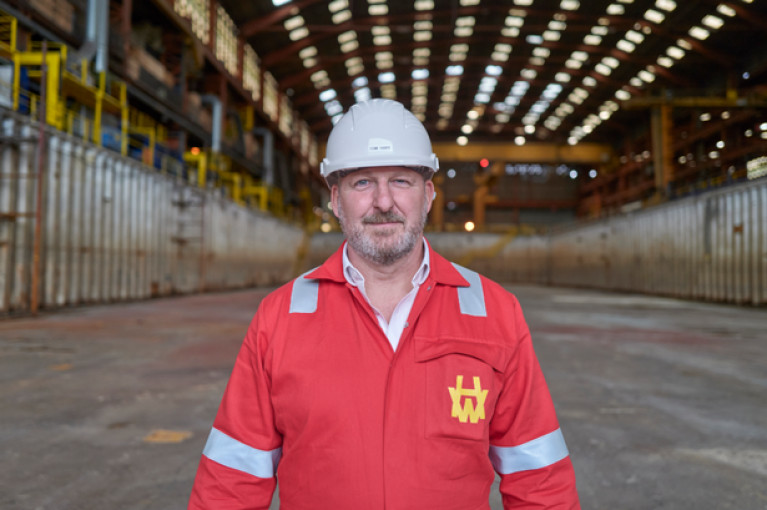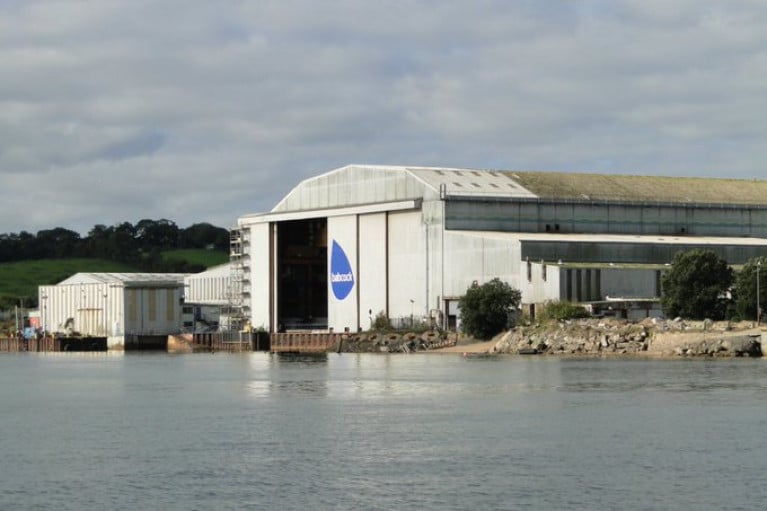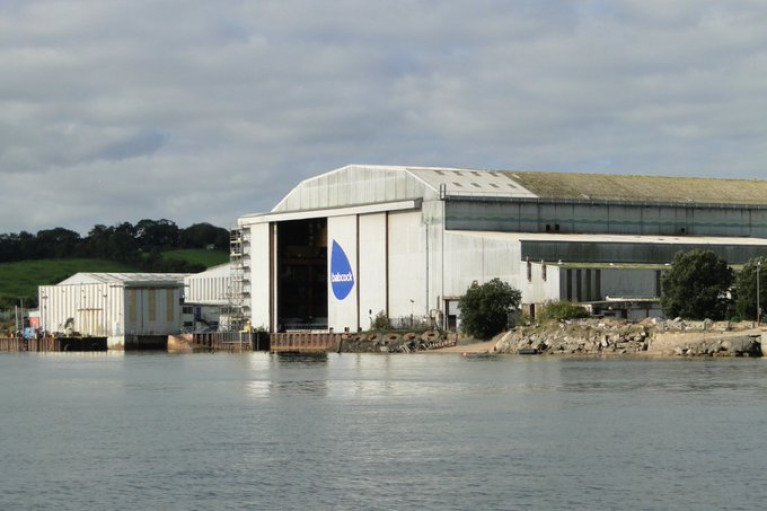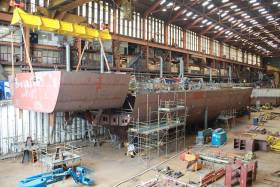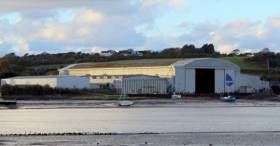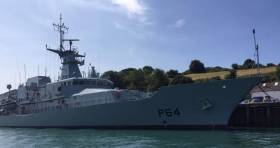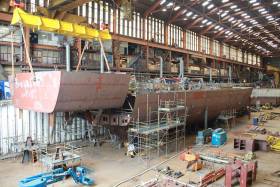Displaying items by tag: Appledore Shipyard
H&W Appoints New General Manager at its Appledore Shipyard
Belfast's iconic Harland & Wolff shipyard, has announced the appointment of a new General Manager, Tom Hart to its Appledore shipyard in England, which was acquired a year ago.
Bringing over 30 years of experience in project, operations and construction management throughout the United Kingdom and United Arab Emirates, Mr Hart joins Harland & Wolff (Appledore) from Dubai based, Drydocks World where he was Director of Projects & Engineering.
He joins after the site has enjoyed major investment and upgrades since the InfraStrata plc acquisition and is now fully operational.
Mr Hart began his career in the Merchant Navy as a cadet before moving to P&O Ferries, where he rose through the ranks from Marine Engineer to Chief Engineer.
Moving shore-side, he then headed to the UAE to join Dubai Drydocks as a Ship Repair Manager. During his time in Dubai, Mr Hart moved from drydocks into the oil and gas industry, where he project managed new-build jack-up oil rigs and offshore wind turbine installation ships with MIS & Lamprell Energy. He also held various other positions such as Commissioning Manager and Group Operations Manager, where he ran three shipyards.
Mr Hart then returned to Dubai Dry Drydocks for a final two-year stint as Director of Project Management & Engineering.
Now in his role as General Manager, based in Appledore, North Devon, Mr Hart will be responsible for the overall day-to-day running of the site. This includes the organisation and logistics for all incoming projects, site safety and security as well as overseeing all monetary aspects.
Tom Hart commented: “Leaving Dubai to move “home” after 20 years was a huge decision but one that I, along with my family, are very excited about. I’m really looking forward to settling in at Appledore, and hope to share some great practices, and skills I have gained from my international experience to build up British shipbuilding and ship repair and be a part of its revitalisation. Building up business, creating work for the local community and increasing the yard’s revenue and margins with a steady flow of work will be my main goal. I am delighted to be appointed General Manager of Harland & Wolff (Appledore) – a yard with a very impressive history. I am looking forward to leading the team there and collectively bringing success to the Harland and Wolff Group.”
Harland & Wolff is a multisite fabrication company, operating in the maritime and offshore industry through five sectors: commercial, cruise and ferry, defence, oil & gas and renewables and six services: technical services, fabrication and construction, decommissioning, repair and maintenance, in–service support and conversion.
Its Belfast yard is one of Europe’s largest heavy engineering facilities, with deep water access, two of Europe’s largest drydocks, ample quayside and vast fabrication halls.
As a result of the acquisition of Harland & Wolff (Appledore) in August 2020, the company has been able to capitalise on opportunities at both ends of the ship-repair and shipbuilding markets where this will be significant demand.
In February 2021, the company acquired the assets of two Scottish based yards along the east and west coasts. Now known as Harland & Wolff (Methil) and Harland & Wolff (Arnish), these facilities will focus on fabrication work within the renewable, oil and gas and defence sectors.
Harland & Wolff is a wholly-owned subsidiary of InfraStrata plc (AIM: INFA), a London Stock Exchange-listed firm focused on strategic infrastructure projects and physical asset life-cycle management.
In addition to Harland & Wolff, it owns the Islandmagee gas storage project, which is expected to provide 25% of the UK’s natural gas storage capacity and to benefit the Northern Irish economy as a whole when completed.
Historic UK Shipyard Appledore Acquired by Owners of Harland & Wolff
In the UK the Appledore Shipyard in south-west England which built its last ship for the Irish Naval Service is set to reopen, it has been announced.
The historic shipyard as previously reported, has been acquired by Infrastrata, the owners of Belfast shipyard Harland and Wolff.
The deal will see the shipyard, which was closed by Babcock in March 2019, renamed H&W Appledore.
Infrastrata acquired the Belfast yard in December 2019, and believe the Appledore facility will be the ‘go-to’ yard in the region for small vessel requirements.
It said while each yard will be a standalone business in its own right, Appledore would be ideally placed to handle any extra work from Belfast.
The acquisition only comes with one employee – the site manager – but the company believes the workforce can be ‘very quickly ramped up’ upon the execution of contracts, and said discussions with the Government and private vessels were already under way.
For further reading NorthDevonGazette has more.
In the UK the Government has been accused of ‘dither and delay’ following claims a viable buyer has been lined up for Appledore shipyard for four months.
The GMB Union, according to NorthDevon Gazette, (yesterday, 31 January) criticised the Government for ongoing delays in the potential re-opening of the yard as Afloat previously reported.
GMB said it and its sister trade unions have been involved in ongoing negotiations, led by the South West Business Council, to re-open the yard and secure a viable future.
Matt Roberts, GMB organiser, said: "A buyer with a viable proposition has been lined up for over four months now, but there seems to be dither and delay from the Government, causing more uncertainty for our members.
More on this story click here
For previous Afloat coverage on the shipyard's final vessel LÉ George Bernard Shaw which last year joined the Irish Naval Service.
UK Shipyard of Appledore in Devon Close to Reopening
In the UK at the Appledore shipyard in Devon, the facility is close to reopening, 12 months after its 164-year shipbuilding history appeared to have come to an end.
The shipyard could reopen as soon as December if a deal is secured, although the terms may not be finalised for a fortnight or more, as the Guardian understands.
The future of the shipyard, which made components for HMS Queen Elizabeth and the new generation of aircraft carriers (and Afloat adds patrol vessels for the Irish Naval Service), came under threat after Babcock International, a FTSE 250 defence and outsourcing company, chose not to renew its lease in November 2018.
Multiple parties are understood to be in involved in talks about taking on the shipyard, including a consortium led by Devon-based shipbuilders House of Santon Maritime, according to two sources. House of Santon did not respond to requests for comment.
For further reading on this development click here.
UK Trade Union Welcomes New Hope for Appledore Shipyard
In the UK, the union for shipbuilders GMB has welcomed reports of hopes for the reopening of Appledore Shipyard, writes North Devon Gazette.
The news follows a high level meeting convened by Torridge MP and Attorney General Geoffrey Cox at 10 Downing Street last Friday (Sept 27) with the Government's taskforce dedicated to reopening the shipyard.
Afterwards Mr Cox said he was 'cautiously optimistic' about its future and was hopeful the yard could reopen.
Earlier this month, shipyard workers learned the 'bittersweet' news that former owners Babcock had been selected as the preferred bidder to provide the Government with five Type 31 frigates.
The GMB said it had campaigned to save the yard since the closure was announced last year, handing in a 10,000 strong petition to Parliament, and suggesting several plans to keep the shipyard viable.
More here on the north Devon shipyard whose final ship was the Irish Naval Service OPV LÉ George Bernard Shaw. The P60 class made a delivery voyage almost a year ago to Cork Harbour.
Hopes UK Shipyard in Appledore Could Reopen After Top Level Government Meeting
In the UK, a Torridge MP is ‘cautiously optimistic’ Appledore Shipyard will reopen in the near future after a crucial meeting at Downing Street.
As the North Devon Gazette reports, it follows a high level meeting convened by Geoffrey Cox at 10 Downing Street (yesterday) with the UK Government's taskforce dedicated to reopening the shipyard.
The taskforce, led by SW Business Council chairman Tim Jones has been working with the MP since the withdrawal of operator Babcock and the closure of the yard in March this year to secure new owners and to provide the Yard with a stable future.
Mr Cox, who has met potential owners and new customers to secure their support for the Yard over recent months has said that he is now 'cautiously optimistic' about its future, particularly as the Government has announced its intention to revive British shipbuilding.
The meeting heard from the Mr Cox of the shipbuilding heritage on the Torridge and its importance to the local economy.
For on this story can be read here.
A Plymouth businessman Connor Johnson reports North Devon Gazette has launched a critical campaign through crowdfunding to raise £400,000 by the end of May to seed the revitalisation of the Appledore shipyard which closed in March.
Mr Johnson says he has an investor company waiting in the wings and willing to put in £4 million if he can raise 10 per cent of the capital needed.
He has launched a gofundme online page and says those who invest a minimum of £100 will receive 100 shares in the new Appledore Shipyard Ltd company he has just created. There are also options to invest £500 or £1,000.
The director of Patriot Yachts International in Plymouth is convinced Appledore has a future as a shipyard and believes there are plenty of opportunities to win contracts in the civilian boat market.
For further reading click here on the yard that Afloat.ie adds built a quartet of OPV90's (P60 class) ordered by the Irish Government's Department of Defence and servce a career in the Naval Service.
The shipyard's final ship, L.E. George Bernard Shaw (P64) was last month named and commissioned into the Naval Service at a ceremony held on Waterford City quays.
A previous pair of the OPV80 (P50 class) were too completed for the Naval Service at the facility near Bideford albeit under different ownership.



























